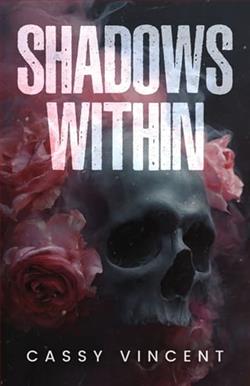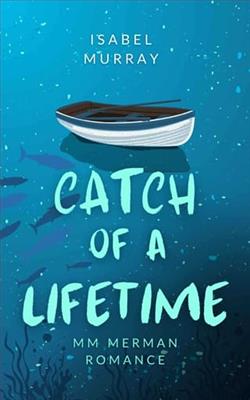Page 7 of Clashing Moon
“Which way should we go?” I asked.
She clasped her gloved hands together. “He might have gone up to the little cabin.”
“Cabin?”
“It’s the log cabin they built a hundred years ago when my family first bought the ranch. No one’s lived there in a long time, but I go up there to get away from my dad occasionally. I’m sure that’s where he went. I don’t know why, but who knows with him these days?”
“Makes sense.” We started out, calling his name as we went deeper into the forest.
The wind picked up, howling through the trees. I had to hold on to my cap with one hand while clutching my medical bag with the other. Our breathing turned labored as the hill grew steeper. We kept on for another five minutes. The snow fell heavily around us, making it harder and harder to see.
At one point, she stopped and turned to me. “It’s that direction. I know it by the trees. Follow me.” She pointed toward the right.
We didn’t get much farther before the snowstorm hit us like an avalanche. One moment, the world was still recognizable. The next, it was as if the sky had dropped, and we were swallowed whole by a wall of white. I couldn’t see more than a few feet in any direction; everything beyond that was lost in the storm. The flakes didn’t just fall from above—they were hurled at us from every direction, stinging my face, blinding me, making it impossible to tell up from down, earth from sky. My hands, despite my gloves, were numb with cold, and my legs ached.
The wind was the worst of it. I’d been in blizzards before, but this was something else. It shrieked and wailed, whipping the snow into a frenzied weapon. In minutes, the snow began to pile up around us—two inches, four, maybe more, in what felt like the blink of an eye. My boots sank into the deepening drifts with every step, the snow clinging to me, weighing me down. The wind funneled through the trees, carving out strange patterns in the snow, piling it high in some places, stripping it bare in others. Every step became a struggle. I don’t know how much time passed. It could have been five minutes or an hour. I was so disoriented that I had no idea.
I called out to Arabella, but my words were swallowed up by the storm. She continued to take the lead, treading forward as if she knew where she was going. But did she know where wewere? Because I couldn’t see a darn thing. The snow had turned the forest into a maze. I’d never felt so disoriented, so lost. I tried to keep my bearings, but it was like trying to navigate blindfolded.
We pushed against the wind, heavy and wet, making it feel as if I were wading through quicksand. My muscles burned, and my lungs ached with the effort, but we couldn’t stop. We had to keep moving.
Arabella lifted her arm, pointing in front of her, indicating that I should continue to follow her. I nodded and followed, staying as close to her heels as I could.
Cold sliced through my clothes. I knew we didn’t have much time. The wind chill was deadly. We had to find shelter, and soon, or we wouldn’t make it long.
We kept moving through the blanket of white. I had no choice but to trust Arabella. But she was a Montana girl. Tough and savvy. If she said we were going in the right direction, we probably were.
Finally, I noticed a shadow, a faint outline of a structure. Could it be? We continued toward it until it appeared as a vague, dark shape. Another minute and perhaps eight more steps, and we were there. I’d never been so happy to see a crude log cabin in my life.
Arabella pushed open the door, and we practically fell inside, almost losing our balance before I slammed the door behind us. For a moment, I couldn’t see. Soon, though, my eyes adjusted. Other than a door that led to a tiny bathroom, the cabin consisted of one room. A rickety table and a few chairs took up one corner. A woodstove, looking about a hundred years old, stood in another. Near the only window, someone had left a pile of books on a beat-up old trunk.
Best of all, a stack of wood near the stove would last a few days. I also spotted cans of chili and ravioli stacked on a shelfnear the stove. A few plastic cups and bowls sat on a shelf near the stove. How often did she come up here?
I peeked my head into the bathroom, relieved to see a sink and toilet. A quick turn of a knob brought forth water into the sink, cold, but at least we wouldn’t be thirsty. I didn’t know how long we might be here, but by the looks of that storm, it could be until tomorrow morning.
I’d been thinking too fast to realize that Arabella expected her father to be here. He was not.
She sank into one of the chairs and buried her face in her gloved hands.
I knelt next to her. “We don’t know anything, okay? He’s probably somewhere warm and safe.”
She met my gaze but didn’t say anything. The defeated expression in her eyes told me exactly what she thought about my suggestion.
“Do you come up here a lot?” I asked.
“When I was a kid, I used to come to get away from Dad and study. In the spring and summer, I’d spend days and days here—reading, taking walks, splashing in the creek. In the fall and winter, I’d hole up here and hit the books. Eating whatever I wanted.” She gestured toward the canned goods. “He didn’t like me to eat anything like that because of my weight.”
“This was your spot to be free.” The thought made me sad. For a moment, I imagined what it would be like to have someone scrutinize your weight and eating so closely. As a family practitioner, I had patients of all ages struggling with their weight. There was so much shame around it, which made no sense medically. Some folks had slower metabolism than others. Body types were varied, yet the women who came to me always seemed to compare themselves to a stick-thin model or actress, as if everyone should look the same. My youngerpatients especially struggled. With the influx of social media they’d grown up with, it was only getting worse.
Arabella continued. “Like I said, this was the original house when my family first settled here. They quickly realized that building in the foothills was a much better idea. But the cabin remained. Over the years, it became a sanctuary of sorts.”
“Thank God you could find it in the storm. I couldn’t see a thing.”
“I know the landmarks like the back of my hand. This tree and that tree, a boulder near the creek. Still, I wasn’t sure of what I was seeing. At least I wasn’t positive. I had to go on my instinct.”
“It worked. Here we are. Safe.” I sat in the other chair and peeled off my wet gloves. “Please tell me the woodstove works.”
“It does.”















